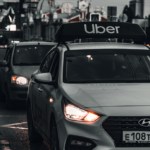 The early months of the Covid pandemic were stressful for many workers, but perhaps especially so for those in the gig economy who were often outside of the boundaries set by any government support measures.
The early months of the Covid pandemic were stressful for many workers, but perhaps especially so for those in the gig economy who were often outside of the boundaries set by any government support measures.
Research from the University of Washington highlights the stress this caused, not least due to the high risk of exposure to the virus felt by gig workers, and particularly app-based drivers.
“It’s a job that is vital to so many people, for moving people to and from medical appointments, to and from the airport, etc. Obviously, app-based drivers are essential for moving people,” the researchers say. “It’s vital work, but it’s largely something the general public seems to forget about.”
Risky rides
The study highlights the risks involved with each ride, not least from the potential to catch the virus from passengers. With the typical driver taking dozens of passengers per day, it’s a risk that many of us take for granted.
This health risk was exacerbated by the lack of financial protection that often meant drivers faced the prospect of putting their health at risk or going without any income at all. What’s more, most had to foot the full cost of any protective measures for their vehicle.
The study found that most drivers felt high levels of stress during the pandemic, not least due to concerns about catching the virus. Many also reported difficulties in securing state support for any lost income during the period, with few revealing they received appropriate support from the company they drove for in terms of protective equipment.
“For workers who are in this kind of employment during the pandemic, they receive very little support from the companies that they drive for, and this is a population that had a lot of awareness of the potential exposures they could be facing,” the researchers say. “They had a lot of concerns and worries, not only about how those exposures would be affecting their health and their family’s health, but also the viability and their job.”
Sense of isolation
What’s more, the isolated nature of gig work meant that drivers felt unable to band together, whether for informal social support or to lobby the companies they drive for for better conditions.
Even seemingly straightforward issues, such as finding restrooms, were complicated during the pandemic as many public restrooms were shut to try and stop the spread of the virus.
“You have other people who are doing the same job as you, but you may never interact with them. So you miss out on some of that strength, not only brainstorming of like, ‘Hey what masks are you using?’ or ‘Where are you stopping?’ but it also keeps workers from organizing,” the researchers conclude. “If you get these workers talking to each other and recognizing that they are all facing the same struggles, that can lead to changes.”